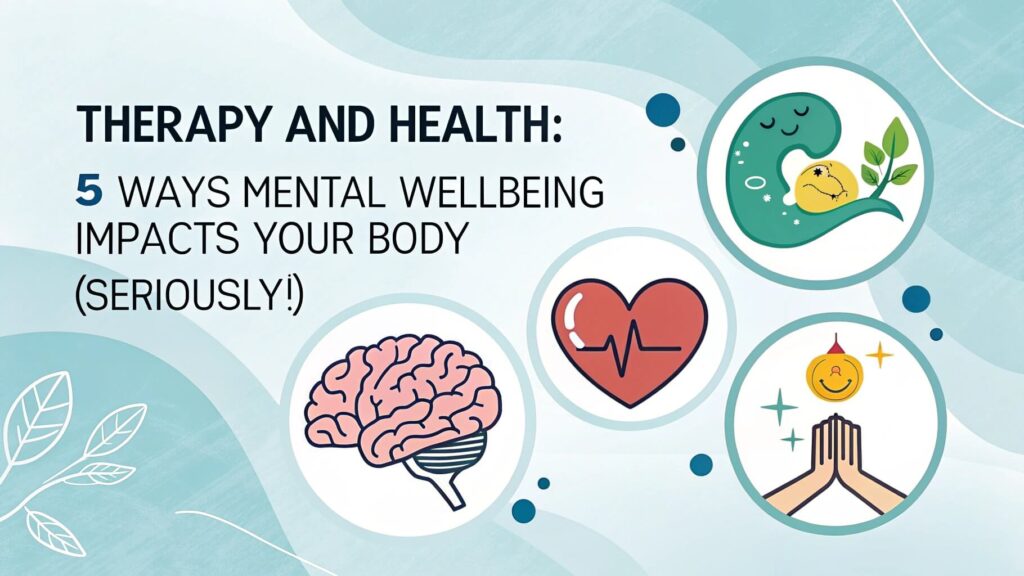G’day legends! Let’s be honest, us Aussies? We’re pretty good at toughing things out. Sunburnt at cricket? Chuck on some aloe. Long shift? Crack open a cold one. But here’s the rub: when it comes to what’s going on upstairs – in the ol’ noggin – that whole “she’ll be right” attitude can sometimes backfire spectacularly. We’ll book the dentist, smash out a gym sesh, and religiously slather on the sunscreen, but how often do we really check in on our mental gearbox?
Turns out, your mental wellbeing isn’t some separate entity floating around. Nah, it’s tangled up tighter than last year’s Christmas lights with your physical health. Ignoring stress, anxiety, or just feeling a bit flat for too long? It’s like ignoring that weird engine noise in your ute – eventually, something bigger’s gonna give way. Therapy isn’t just for “serious stuff”; it’s legit health maintenance, like getting a service. Let’s yarn about 5 very real ways your mental state directly messes with – or massively helps – your actual body.
1. Stress: Your Body’s Unwanted Long-Term Tenant (Kick it Out!)
We all know stress. That deadline breathing down your neck, the M5 carpark at 5pm, the sheer panic when you realise you forgot your mate’s birthday BBQ again. A bit here and there? Annoying, but manageable. But when stress moves in permanently, couch-surfing in your nervous system? That’s when it starts doing some proper damage.
Think of your body stuck in permanent “fight or flight” mode. Cortisol and adrenaline – great for sprinting away from a grumpy room – become toxic when they’re constantly flooding your system. Your poor immune cops it first, meaning you catch every sniffle going ‘round the office. Inflammation goes haywire (linked to everything from dodgy tickers to sore joints). Blood pressure creeps up, sleep goes to crap, and you just feel constantly wrecked. Headaches, mystery aches, that general feeling of being run over by a bus? Yeah, chronic stress is likely the dodgy mechanic under the hood.
Therapy gives you actual tools, not just bandaids. And in today’s fast-paced world, modern solutions like e-prescribing can also help streamline your healthcare, ensuring you get the medications you need even when life feels overwhelming, reducing another source of stress. Stuff like CBT helps you spot those stress-spiralling thoughts and flick ‘em away. Mindfulness teaches your body how to actually switch off the alarm bells. Sometimes, just dumping all that pressure out loud to someone neutral makes the load feel tonnes lighter. Less internal chaos = a body that can actually heal and defend itself properly.
2. When Your Brain Cranks Up the Pain Volume (It’s Not Just “In Your Head”)
Ever had one of those weeks where everything hurts more? Your dodgy knee flares, your back seizes up, even your earlobe feels sensitive? And surprise, surprise – you’re also stressed to the max or feeling properly down in the dumps. Coincidence? Not a chance.
Depression and anxiety aren’t just mood killers; they’re like cranking the volume knob on your body’s pain signals right up to eleven. Stuff that might normally be a minor niggle suddenly feels like a full-blown crisis. They’re also mates with chronic pain conditions – fibromyalgia, migraines, brutal tension headaches, and the dreaded IBS. It becomes this awful loop: pain makes you feel worse mentally, feeling worse mentally makes the pain feel even more intense.
This connection hits hard with things like persistent toothache. Left unchecked (maybe because you’re stressed and avoiding it?), it becomes a constant background throb that drags your whole mood down. Sorting out the root cause, whether it’s a filling or looking into dental implants for teeth that are beyond saving, isn’t just cosmetic. It’s about silencing a major pain source that feeds back into that vicious mental-physical loop. Getting rid of that constant ache? Massive relief for your whole system.
Therapy doesn’t just tell you to “think positive.” It tackles the emotional fuel feeding the pain. Techniques help you manage the frustration and fear around the pain, which actually dials down its intensity. A good therapist can also spot physical tension patterns you’ve developed (hello, clenched jaw!) and help you unlearn them. Breaking that pain-mood connection is pure gold.
3. Gut Feelings? More Like Gut Reactions (Your Tummy’s Got Feelings Too!)
That “gut feeling” saying? Deadset accurate. Your digestive system is wildly sensitive to your emotional weather. Nervous before a big presentation? Suddenly I need the loo. Stressed about family stuff? Hello, stomach cramps and bloating that could rival a blowfish. Your gut is basically your second brain, and it gossips constantly with the first one.
Anxiety and chronic stress are like throwing a grenade into your digestive peace. Nausea, cramps, the runs, being blocked up, feeling like you’ve swallowed a basketball – sound familiar? Conditions like IBS are notoriously stress-reactive. When your nervous system is in overdrive, digestion gets shoved to the bottom of the priority list. Nutrients don’t get absorbed properly, making you feel even more fatigued and ordinary. It’s a rubbish cycle: stress messes with your gut, gut problems cause more stress. Rinse and repeat.
Couples Therapy, especially approaches focusing on that gut-brain chat (like gut-directed hypnotherapy or specific CBT), can be a game-changer. Learning how to genuinely calm your nervous system (not just pretending!) directly soothes the chaos in your digestive tract. It helps interrupt that awful loop where stress triggers gut fireworks, which then stresses you out even more. Calmer mind, calmer tum.
4. Sleep: The Ultimate Repair Shop (And Mental Health Holds the Keys)

We know sleep is magic. It’s when your body patches up the day’s wear and tear, sorts out hormones, and files memories. But try telling that to your brain at 3 am when it’s decided to replay every awkward thing you’ve ever done. Mental health struggles are the ultimate sleep thieves.
Anxiety turns your brain into a hyperactive toddler on red cordial at bedtime. Depression? It either glues you to the mattress for 12 hours (but you wake up feeling like you ran a marathon) or has you staring at the ceiling all night, utterly exhausted but wired. Crappy sleep is a disaster for your body. Your immune system tanks (hello, constant colds!), your brain feels foggy, inflammation skyrockets, hunger hormones go haywire (suddenly craving chips at 2 am?), and your risk for serious stuff like heart disease and diabetes climbs. Feeling permanently like a zombie? Your mental state is probably the ringleader.
Therapists get to the why behind the sleeplessness. CBT for Insomnia (CBT-I) is the gold standard – no pills, just solid strategies to retrain your brain and body for sleep. It helps quiet the 3 am mental chatter, tackles unhelpful beliefs (“I’ll NEVER sleep!”), and sets up rock-solid sleep routines. Dealing with the root anxiety or depression? That’s the master key to unlocking a genuinely restful kip. Your body desperately needs that repair time.
5. Energy & Motivation: It’s Not Laziness, It’s Your Brain Draining the Tank
Feeling utterly rooted? Like even the thought of taking the bins out feels like climbing Everest? When basic self-care – cooking a decent meal, going for a walk, even just showering – feels like a monumental effort, it’s easy to just label yourself “lazy.” But more often than not, your mental battery is just completely flat.
Depression is notorious for being an energy vampire. Anxiety is exhausting too – constantly being on high alert drains your reserves faster than a phone running 50 apps. This energy crash creates a massive roadblock to doing the stuff that actually helps your physical health. You skip the walk, grab Uber Eats instead of cooking, and put off that doctor’s appointment. Over weeks and months? Fitness slides, weight can creep up, muscles weaken, and you feel worse and worse.
Even small routines feel impossible. Take something simple like styling your hair. Maybe you usually grab your trusty hair irons for a quick fix, but when you’re feeling low? Just plugging the damn thing in can feel like a Herculean task. It becomes another thing you skip, feeding into that cycle of neglecting yourself. And here’s the kicker: when you feel this flat, sticking to any health plan is harder. Therapy helps clear the fog so you can actually manage the practical stuff that keeps you physically on track.
Therapy tackles the mental fatigue and the “can’t be bothered” feeling head-on. By working through depression or anxiety, you often find your natural spark and energy start creeping back. A good therapist helps you set teeny-tiny, achievable goals (“Walk to the letterbox today”) to rebuild momentum without feeling overwhelmed. That returning energy is the fuel you need to get moving, eat better, and care for yourself. It breaks the inertia cycle.

